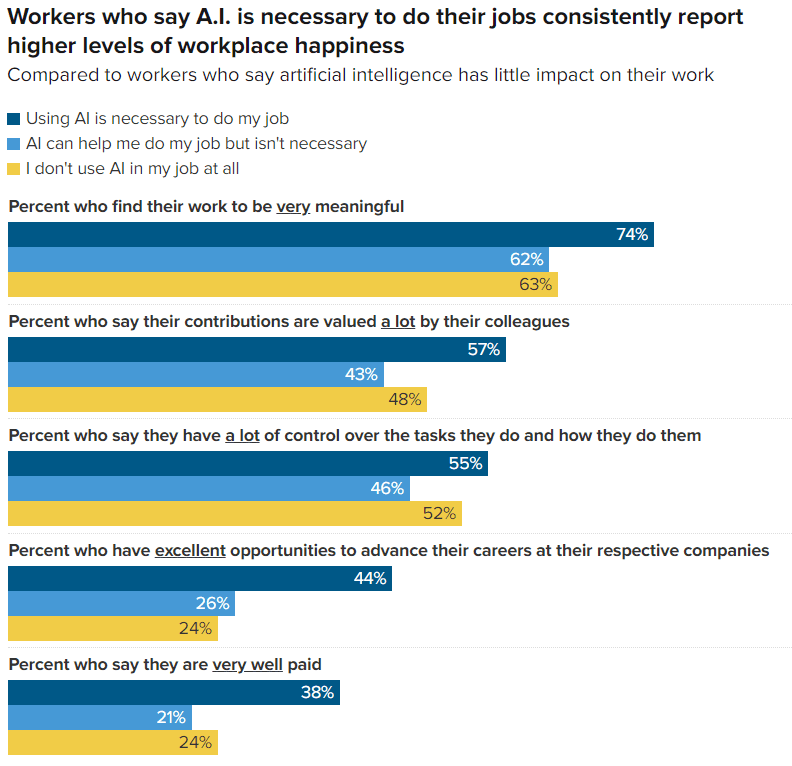TL;DR:
- Workers who embrace AI in their jobs are experiencing higher job satisfaction, salary increases, and opportunities for career advancement.
- The Workforce Happiness Index reveals that AI adopters have a significantly higher score than non-adopters.
- AI-enabled workers report greater satisfaction in aspects such as pay, autonomy, recognition, and meaningfulness compared to their peers.
- The use of AI contributes to salary gains that outpace inflation, leading to increased workplace morale.
- Early AI adopters are a diverse group, typically younger and less likely to be white, but not necessarily earning six-figure incomes.
- Industries such as advertising, marketing, business support, logistics, and technology have higher AI adoption rates.
- Despite higher satisfaction, early AI adopters express heightened concerns about job security.
- The willingness to embrace AI by choice, rather than necessity, is a key factor in the success of early adopters.
Main AI News:
The advent of ChatGPT has triggered concerns that artificial intelligence (AI) will swiftly replace human labor, rendering workers redundant and making entire job functions obsolete. Why pay a human when an algorithm can perform the same task for free?
However, a closer look at workers who have already embraced AI reveals a contrasting reality—they are thriving. These early AI adopters not only enjoy recent salary increases that outpace inflation but also consider themselves well-compensated, with ample opportunities for career advancement and high morale within their organizations. Rather than a threat, AI has become a boon to their professional lives.
According to the latest CNBC|SurveyMonkey Workforce Survey, workers who rely on AI for their jobs exhibit a remarkable Workforce Happiness Index of 78, surpassing those who don’t utilize AI at all (71) by a significant margin of seven points.
This disparity in workforce happiness between early AI adopters and holdouts surpasses the differences observed based on race (a maximum difference of one point), education (a maximum difference of three points), or work arrangement (fully in-person, fully remote, or hybrid, with a maximum difference of two points).
The Workforce Happiness Index assigns a score to each survey participant, ranging from 0 to 100. Surprisingly, over ten surveys conducted since April 2019, the overall index score has experienced minimal fluctuations, with scores ranging only from 71 to 73 in each iteration. The most recent data from the May 2023 survey encompassed nearly 9,000 workers in the United States, surveyed from May 23 to May 31.
Across all aspects that constitute our Workforce Happiness Index—including pay, autonomy, career advancement opportunities, work recognition, and meaningfulness—workers utilizing AI for their job tasks report greater or equal satisfaction compared to their peers. For instance, 38% of workers who deem AI necessary in their work also expressed being very well paid, in contrast to 24% among non-AI users. Similarly, 44% of workers employing AI report excellent opportunities for career growth within their companies, while only 24% of non-AI users share the same sentiment.
AI, Salary Gains, and Inflation
Beyond the fundamental components of job satisfaction, the divide between AI-enabled workers and luddites manifests in other aspects as well. Workers who perceive AI as indispensable for their job are more likely to state that their salary has outpaced inflation in the past year (33% compared to 10%) and rate workplace morale as excellent (50% compared to 27%), as opposed to those who don’t utilize AI at all.
What could be the reason behind these findings? In recent years, inflation has experienced exponential growth, leaving workers feeling that their salaries have failed to keep up. The Great Resignation, to a large extent, was fueled by the prospect of finding higher-paying jobs elsewhere that aligned with market rates.
According to our latest Workforce Survey, 65% of workers acknowledge that inflation has outpaced their salary over the past twelve months, while 21% claim their salary and inflation have increased in tandem, and a mere 12% report salary growth surpassing inflation. Workers relying on AI for their job tasks are three times more likely than their non-AI-using counterparts to fall into the fortunate category of experiencing salary growth that outpaces inflation. However, this outcome may not solely be attributed to chance.
Contrary to popular belief, early AI adopters in the workplace are a diverse group. Workers who perceive AI as essential to their job tend to be younger than the average workforce, with 42% falling under the age of 35, compared to 34% across all workers. However, they are less likely to be white (39% compared to 63% of the overall workforce) and not significantly more likely to earn six-figure incomes.
Certain industries exhibit a higher concentration of AI adoption than others. In the advertising and marketing sector, more than one-fifth (21%) of workers affirm that using AI is indispensable for their job, placing it at the top with the highest percentage of workers incorporating AI into their daily work routine. Close behind are business support and logistics (18%), agriculture (15%), hospitality and tourism (14%), automotive industry (12%), and the technology sector (12%), all of which rely on AI to carry out their tasks.
However, even with increased job satisfaction, data suggests that early AI adopters harbor a heightened fear of an uncertain future. Approximately 46% of workers in advertising and marketing, as well as business support and logistics, express concerns that AI will soon replace their jobs—twice the overall level of concern.
Nevertheless, noteworthy is the fact that the technology and advertising/marketing fields boast the fewest workers who claim they don’t utilize AI at all (42% and 33%, respectively), implying that most individuals in the technology sector willingly embrace AI rather than being obligated to do so.
This might be a pivotal reason behind the flourishing state of these early adopters—they are thriving as much by choice as by necessity. Their early integration of AI tools has showcased the immense potential for increased productivity and success, leaving them with no alternative but to wholeheartedly embrace this future.

Chart: Gabriel Cortes / CNBC. Source: CNBC | SurveyMonkey Workforce Survey of 8,874 U.S. workers. Responses collected May 23-31, 2023.
Conclusion:
The rise of AI in the workplace has shown that early adopters who integrate AI into their jobs are reaping significant benefits. This trend indicates a shift towards increased productivity, job satisfaction, and career growth opportunities. Industries that embrace AI are likely to experience a competitive advantage in terms of innovation and efficiency. However, it is important to address the concerns of workers who fear job displacement and ensure that the adoption of AI is accompanied by measures to upskill and reskill the workforce.

